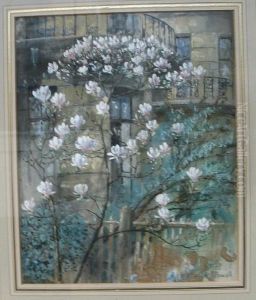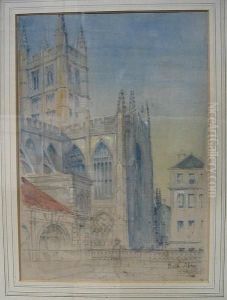Alfred Powell Paintings
Alfred Powell was a pivotal figure in the Arts and Crafts movement, a cultural phenomena that emerged in Britain in the late 19th and early 20th centuries. Born in 1865, Powell's artistic journey was deeply influenced by the movement's ideology, which advocated for traditional craftsmanship using simple forms and emphasized the importance of the decorative arts as a major form of artistic expression.
Powell's work was distinguished by its adherence to these principles, focusing on ceramics, stained glass, and metalwork, among other mediums. He was particularly renowned for his contributions to pottery, developing techniques and styles that married functionality with aesthetic beauty. Alongside his wife, Louise Powell, he embarked on a mission to revive the art of hand-painted pottery, drawing inspiration from medieval and early Renaissance models.
Throughout his career, Alfred Powell collaborated with other artists and workshops, including the famed Cotswold School, to produce works that were both innovative and reflective of the movement's ethos. His efforts were not limited to creation alone; he was also a passionate educator, teaching and lecturing on the values of the Arts and Crafts movement. He believed in the democratization of art, advocating for beauty in everyday objects and the importance of art in the public sphere.
Powell's legacy extends beyond his contributions to the decorative arts. He was instrumental in fostering a community of artists and craftsmen who shared his vision, thereby ensuring the continuation and evolution of the Arts and Crafts movement well into the 20th century. Alfred Powell passed away in 1960, leaving behind a body of work that continues to be celebrated for its craftsmanship, beauty, and adherence to the principles that defined his career and the movement he helped shape.



















